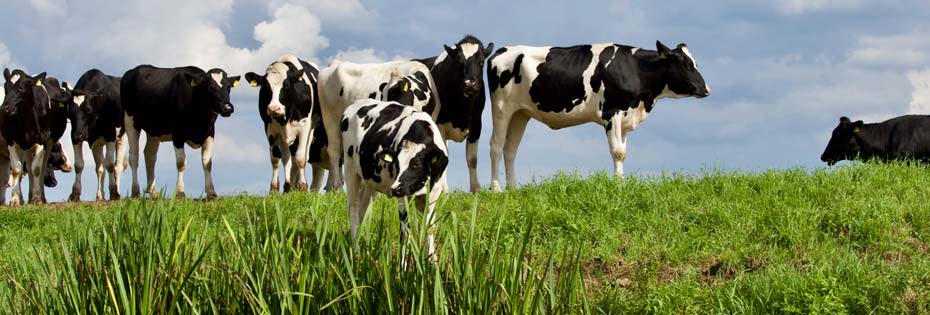The story of EpiCor
The story of EpiCor
We are all looking at ways to strengthen our immune systems, and while a herd of cows do not automatically spring to mind as the first place to look, remarkably, they offer a solution.
A unique remedy that began life helping cows is now helping humans.
Accidental Discovery

As with many discoveries it began accidentally over one hundred years ago with a young farm hand named Clair Bloomhall, who lived on a family farm in the state of Iowa, USA. He noticed that cows fed with fermented milk and table scraps along with their usual grain were healthier than the rest of the herd.
Years later, once retired, he decided to put his theory to the test and created a special fermented yeast culture. Just as he had hoped, it helped keep livestock healthy.
The Bloomhall family went on to become the largest and most respected producer of animal health worldwide. But the story doesn’t stop there. With the development of science, in 1998 it was recognised that the factory workers who made this special fermented feed were taking less sick leave than the workers in the offices; instead of the other way around as was expected.
The special fermentate they worked with has now been developed into the whole food fermentate called EpiCor®. It has won a Scientific Excellence Award in the USA and has numerous research studies to support it.
Fermented foods
We know fermented foods are good for us.
They are not only able to provide us with good “bacteria”, but also to provide food and metabolites for our own gut bacteria. Our good gut bacteria will use these metabolites to grow and to produce more metabolites, which will help our bodies.
What is a Whole Food Fermentate?
A whole food fermentate is an ingredient made through a natural fermentation process, which has not been processed.
EpiCor is minimally processed and refined. It is made using plant-based ingredients that go through fermentation processes to produce a whole product. It’s not an extract, chemically synthesized or made from by-products. The whole fermentation broth is gently dried to preserve all the natural components.
It’s made from a combination of proteins, fibres, polyphenols, vitamins, amino acids, beta glucans and other metabolites that altogether has been shown in human studies to help to support the gut microbiome and immune system.
In Summary

An accidental discovery, over one hundred years ago on a family farm in Iowa, USA, led to a unique remedy that began life helping the immune system of cows and much later led to the creation of a special fermented yeast culture to support immune health. Our gut houses around 70% of our immune cells. The probiotic content of ‘live’ fermented foods support gut health by contributing to the diversity of the beneficial bacteria that reside there.
References
1. Schauss, A. G.; Vodjani, A., Discovery of edible fermentation product with unusual immune enhancing properties in humans. FASEB J 2006, 20 (4), A143.
2. Jensen, G. S., et al. An anti-inflammatory immunogen from yeast culture induces activation and alters chemokine receptor expression on human natural killer cells and B lymphocytes in vitro. Nutrition Research 2007, 27, 327-335
3. Moyad, M. A., et al. Effects of a modified yeast supplement on cold/flu symptoms. Urol Nurs 2008, 28 (1), 50-5.
4. Jensen, G. S., et al. A double-blind placebo-controlled, randomized pilot study: consumption of a high-metabolite immunogen from yeast culture has beneficial effects on erythrocyte health and mucosal immune protection in healthy subjects. Open Nutr J 2008, 2, 68-75
5. Honzel, D, et al. Comparison of chemical and cell-based antioxidant methods for evaluation of foods and natural products: generating multifaceted data by parallel testing using erythrocytes and polymorphonuclear cells. J Agric Food Chem 2008, 56 (18), 8319-25
6. Moyad, M. A., et al. Immunogenic yeast-based fermentation product reduces allergic rhinitis-induced nasal congestion: a randomized, double-blind, placebo-controlled trial. Adv Ther 2009, 26 (8), 795-804.
7. Moyad, M. A., et all. Immunogenic yeast-based fermentate for cold/flu-like symptoms in nonvaccinated individuals. J Altern Complement Med 2010, 16 (2), 213-8.
8. Jensen, G. S., et al. Antioxidant bioavailability and rapid immune-modulating effects after consumption of a single acute dose of a high-metabolite yeast immunogen: results of a placebo-controlled double-blinded crossover pilot study. J Med Food 2010, 14, 1002–1010
9. Evans, M., et all. A dried yeast fermentate prevents and reduces inflammation in two separate experimental immune models. Evid Based Complement Alternat Med 2012, 2012, 7.
10. Possemiers, S., et al. A dried yeast fermentate selectively modulates both the luminal and mucosal gut microbiota and protects against inflammation, as studied in an integrated in vitro approach. J Agric Food Chem 2013, 61 (39), 9380-9392.
11. Marzorati, M., et al. The HMI module: a new tool to study the Host-Microbiota Interaction in the human gastrointestinal tract in vitro. BMC Microbiol 2014, 14 (1), 133.
12. Jensen, G. S., et all. Anti-inflammatory properties of a dried fermentate in vitro and in vivo. J Med Food 2014, 18(3), 378-84
13. Durcray, H.A.G., et al. Mitigation of heat stress-related complications by a yeast fermentate product. Jl Therm Bio 2016, 60,26–32.
14. Pinheiro, I., et al. A yeast fermentate improves gastrointestinal discomfort and constipation by modulation of the gut microbiome: results from a randomized double-blind placebo-controlled pilot trial. BMC Complement Altern Med 2017, 17 (1), 441.
15. Ducray, H.A.G., et al. Yeast fermentate prebiotic improves intestinal barrier integrity during heat stress by modulation of the gut microbiota in rats. J Appl Microbiol 2019, 127, 1192—1206.

